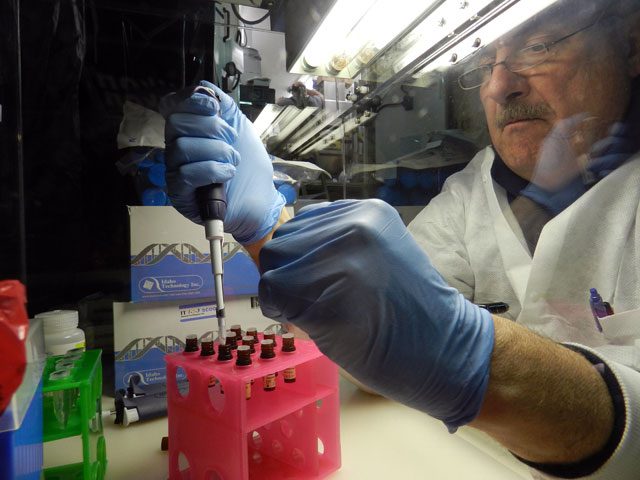Microbiologists from the CBRNE Analytical and Remediation Activity (CARA), an all-civilian deployable asset housed within the the 20th CBRNE Command based on Aberdeen Proving Ground, are a unique mobile team of highly trained specialists able to conduct field analysis of organisms and toxins and assess laboratory containment, sampling methods and analytical techniques in the field.
“CARA microbiologists are responsible for performing bacterial identification and characterization of potential biological warfare agents,” said Dr. Edward F. Keen III, a scientist on the CARA team. “They operate laboratory equipment designed to analyze nucleic acids, antibody and antigen interactions and colony morphology.”
These highly trained Army civilians also employ classical microbiology methods and other scientific techniques to include PCR, electrochemiluminescence (ECL), enzyme linked immunosorbent assay (ELISA) and fluorescent microscopy, said Keen.
Microbiologists should be technical and scientific experts with meticulous attention to detail and excellent interpersonal and communication skills, said Keen.
“I wanted to become a microbiologist because I have always had an interest in the prevention, diagnosis and control of infectious diseases,” said Keen, a native of Olney, Maryland, who has previously served in a variety of microbiology and countering Weapons of Mass Destruction positions with the U.S. Army and Army Reserve.
Timothy M. Reed, a microbiologist at CARA, said they have to stay ready to deploy in support of military operations.
“With research science, every day can be different,” said Reed. “The day’s task can vary from loading a flow cell on a DNA sequencer to loading a forklift with quadcons to support the upcoming mission.
“We work daily to ensure our scientists, instrumentation and mobile lab are ready to move out the door at a moment’s notice,” said Reed. “This allows us to quickly establish our theater validation operations to inform the warfighter of any potential Weapons of Mass Destruction.”
Once their laboratory is established in the theater of operations, microbiologists work to identify and characterize biological threats and quickly disseminate the results to combatant commanders to inform their decisions and mission planning. The results of the theater validation can impact operational and strategic decisions.
Though our microbiologist team is small, they remain on the cutting edge of developing and using new processes for more accurate and encompassing testing procedures such as next generation genome sequencing. This will provide our team to more rapidly identify emerging biological threats, naturally occurring or man-made. ”
Franz J. Amann, Director, CBRNE Analytical and Remediation Activity
During mobile lab operations, microbiologists collaborate with other government agencies to bring new and emerging technology to U.S. troops, working side-by-side to provide changes that guide the development of the detection devices.
Born in Grinnell, Iowa, and raised in Dallas, Reed started working for CARA in 2014 because he wanted to serve his country.
“This job allowed me to be on the frontlines of scientific discovery while helping the warfighters on the frontlines,” said Reed.
CARA routinely has open job announcements for microbiologists. You can find the announcements on USAJobs.gov by searching APG – Microbiology job series 0403. Grades can vary between GS-05 to GS-11 depending on the requirements and individual experience.
Adapted from original story by Walter Ham, 20th CBRNE Command



